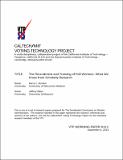| dc.contributor.author | Burden, Barry C. | |
| dc.contributor.author | Milyo, Jeffrey | |
| dc.date.accessioned | 2015-07-02T18:03:51Z | |
| dc.date.available | 2015-07-02T18:03:51Z | |
| dc.date.issued | 2013-09-06 | |
| dc.identifier.uri | http://hdl.handle.net/1721.1/97656 | |
| dc.description.abstract | In every election an army of temporary poll workers must be recruited and trained to both assist the public in exercising the right to vote and to enforce the rules governing the voting process. These poll workers are geographically dispersed and serve as the front line workers interacting with tens of millions of voters. Principal-agent theory suggests that this is a difficult task for election officials. Because they are self-selected, poll workers may not be the most qualified. Because they are spread across many jurisdictions simultaneously, they have discretion to shirk their duties. Success or failure in these endeavors is widely assumed to be crucial for voter satisfaction and confidence in the integrity of elections, which may in turn influence voter participation and trust in government generally. | en_US |
| dc.language.iso | en_US | en_US |
| dc.publisher | Caltech/MIT Voting Technology Project | en_US |
| dc.relation.ispartofseries | VTP Working Paper Series;111 | |
| dc.title | the Recruitment and Training of Poll Workers: What We Know from Scholarly Research | en_US |
| dc.type | Working Paper | en_US |
